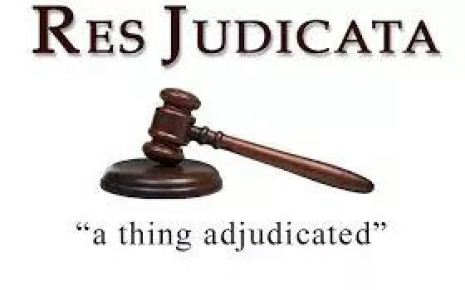Res Judicata

“Res Judicata means a
final judicial decision pronounced by a judicial tribunal having competent
jurisdiction over the cause or matter in litigation and over the parties
thereto.”
Section 11 of the
code of Civil Procedure, 1908[1], embodies the rule of res
judicata or the rule of conclusiveness of the judgment, as to the
points decided either of facts, or of law, or of facts and law, in every subsequent
suit between the same parties. It enacts that once a matter is finally decided
by a competent Court, no party can be permitted to reopen it in a subsequent
litigation.
For making Res
Judicata binding, several factors must be met up with:
# identity in the
thing at suit;
# identity of the
cause at suit;
# identity of the
parties to the action;
# identity in the
designation of the parties involved;
# whether the
judgment was final;
# whether the parties
were given full and fair opportunity to be heard on the issue.
“The principle
of res judicata is based on the need of giving a finality to
judicial decisions. What it says is that once a res is judicata, it
shall not be adjudged again. Primarily it applies as between past litigation
and future litigation. When a matter, whether on a question of fact or a
question of law, has been decided between two parties in one suit or proceeding
and the decision is final, either because no appeal was taken to a higher Court
or because the appeal was dismissed, or no appeal lies, neither party will be
allowed in a future suit or proceeding between the same parties to canvass the
matter again.”
‘Res’ means ‘subject matter’ or
‘dispute’ and ‘Judicata’ means ‘adjudged’, ‘decided’ or ‘adjudicated’. ‘Res
Judicata’ thus means ‘a matter adjudged’ or ‘a dispute decided’.
Object:
The doctrine of res
judicata is conceived in the larger public interest which requires
that all the litigation must, sooner than later, come to an end. The
principle is also founded on justice, equity and good conscience which require
that a party who has once succeeded on an issue should not be harassed by
multiplicity of proceedings involving the same issue. The doctrine
of res judicata is based on 3 maxims:
1. nemo debet bis vexari pro
una et eadem causa (no man should be vexed for the same cause);
2. interest reipublicae ut sit
finis litium (it is in the interest of the State that there should be
an end to a litigation); and
3. res judicata pro veritate
occipitur (a judicial decision must be accepted as correct).
Conditions of Res Judicata
To constitute a matter as res
judicata under Section 11, certain conditions need to be fulfilled,
which were laid down in
1.
The matter directly and substantially in issue in the subsequent suit or issue
must be the same matter which was directly and substantially in issue either
actually (Explanation III) or constructively (Explanation IV) in the former
suit (Explanation I). (Explanation VII is to be read with this condition).
2. The former suit must have been a suit
between the same parties or between parties under whom they or any of them
claim. (Explanation VI is to be read with this condition).
3. Such parties must have been
litigating under the same title in the former suit.
4. The Court which decided the former
suit must be a Court competent to try the subsequent suit or the suit in which
such issue is subsequently raised. (Explanations II and VIII are to be read
with this condition).
5. The matter directly and substantially
in issue in the subsequent suit must have been heard and finally decided by the
Court in the former suit. (Explanation V is to be read with this condition).
Other proceedings where the principle of res
judicata applies are:
· Industrial
Adjudication
· Public
Interest Litigation
· Criminal
Proceedings
· Writ
Petitions under Articles 32 and 226
· Ex
parte decree
· Interim
order or interlocutory order deciding a controversy in part between the parties
Proceedings where res judicata is not applicable are:
· Taxation
matters
· Res Judicata is
not applicable to cases of habeas corpus petitions.
· Dismissal
of suit in default
· Dismissal
in limine
· Dismissal
of Special Leave Petition in limine by a non speaking order
· Compromise
decree, though party is precluded from challenging it by rule of estoppel[39]
· Fraudulent
decree
· Withdrawal
of suit
· In
case of change in circumstances
· Change
in law subsequent to a decision rendered by the Court.
Test of applicability
In the Court held
that in order to decide the question whether a subsequent proceeding is barred
by res judicata it is necessary to examine the question with
reference to
· forum
or competence of the Court
· parties
and their representatives
· matters
in issue
· matters
which ought to have been made the ground for attack or defence in the former
suit
· final
decision.
Res Judicata & Estoppel
The doctrine of res judicata operates as
a bar on the jurisdiction of a court to try a suit which has been conclusively
decided by the court with same parties, same subject matter and under same
title. All these provisions are provided under section 11 of the Code of Civil
Procedure,1908.
Whereas the doctrine estoppel as defined
in Section 115 of the Indian Evidence Act, 1872 provides that “When one person
has, by his declaration, act or omission, intentionally caused or permitted
another person to believe a thing to be true and to act upon such belief,
neither he nor his representative shall be allowed, in any suit or proceeding
between himself and such person or his representative, to deny the truth of
that thing.”


![What is the distinction between an illegal decree and a void decree? Can a void decree be challenged in collateral proceedings? [ D.J.S. 2007 ]](https://blogger.googleusercontent.com/img/b/R29vZ2xl/AVvXsEjslgs-VjQ6xtWEeMIZglaeyzajsPljFIwlPPuJmf1UrAJsVJnR7zWyjPnqTxU71q_ZG4tIdWasg9qqpcdJiHqpUPvYp_6VZA8FFhLWum_SxIfvQwcSw2sfCs8Pf0hyphenhyphenIEAsf7gx1IZDvZo/s72-w375-c-h400/273_EBC_Master%252BGuide%252Bto%252BJudicial%252BServices%252BExamination%255B%255D.png)



No comments